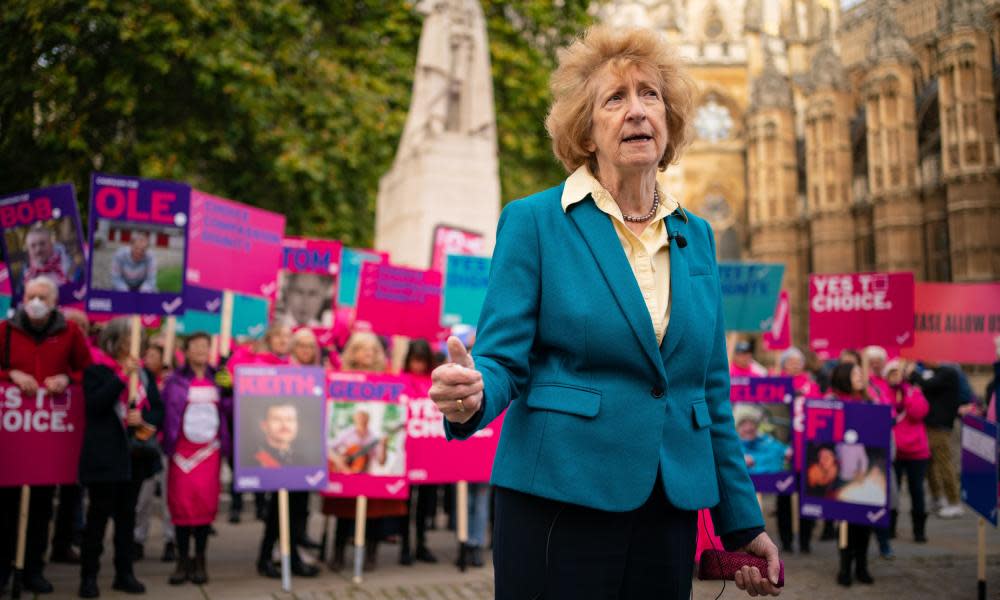Assisted dying inquiry hears people in UK face ‘unbearable suffering’

People dying in the UK face “uncontrollable” pain and “unbearable suffering”, which palliative care alone cannot fix, according to the first evidence to a major new parliamentary inquiry asking if assisted dying should finally be legalised.
In a shocking submission in favour of a law change, Molly Meacher told the Commons health and social care committee that the reality of end of life could include vomiting faeces, endless nausea and decaying tumours that smelled so bad they drove people out of hospital wards.
People “are existing, they’re not living”, the crossbench peer and chair of the charity Dignity in Dying told the committee inquiry, which comes eight years after the House of Commons last considered changing legislation in 2015.
Opening proceedings, the committee chair, Steve Brine, said it was a subject that was “incredibly sensitive and affects us all: which is how we die”.
Members of the public and campaigners for and against assisted dying have already made tens of thousands of submissions. The MPs have visited Oregon, US, where assisted dying has been legal for terminally ill, mentally competent adults since 1997. It is also legal in Australia, New Zealand, the Netherlands, Belgium and several other US states, but remains outlawed in the large majority of countries.
Arguing strongly against any law change, Ilora Finlay, a crossbench peer and palliative care physician, described a patient who said he would kill himself in two weeks, but was alive 11 years later. She highlighted another who had discussed assisted dying but when asked what he would like to do, had said he would go on a cruise, and went on three such trips before he died.
She warned of the risk of “elder abuse” being worsened by a law change and said wider availability of palliative care, which remains patchy in the UK, must instead be a priority. A law change could result in between 5,800 and 58,000 assisted deaths a year depending on whether data from Oregon, the Netherlands or Canada, where it is also legal, was extrapolated, she said.
Such demand would divert an already stretched workforce of NHS clinicians, she said, saying each assisted death would involve about 60 hours of clinical work. She added that palliative care could increasingly control nausea, vomiting and smells from fungating (ulcerating) tumours.
Under the Suicide Act 1961 in England and Wales it is a criminal offence to encourage or assist another’s suicide. But Crown Prosecution Service guidance says charges are less likely to be needed if the victim had reached a voluntary, clear, settled and informed decision and the suspect was wholly motivated by compassion, among other things.
The UK’s population is ageing, with one in four people predicted to be 65 years or over by 2050. Meanwhile, according to the 2019-20 National Audit of Care at the End of Life, two-thirds of hospitals in England and Wales lacked face-to-face specialist palliative care provision eight hours a day, seven days a week.
Charles Falconer, a Labour peer and former Lord Chancellor, described the current situation, where dying people sometimes withdraw their own treatment rather than taking drugs to end their life, as “a mess”. He proposed that assisted dying should be available only to terminally ill people and not those facing “unbearable suffering”, as others have suggested. A diagnosis would be needed from two doctors plus approval from high court judge.
“The bills that have been proposed [previously but defeated] say the person who decides to have an assisted death must have the capacity to make that decision,” he said.
Paulette Hamilton, a Labour MP and committee member, said she was concerned about monitoring systems the committee had seen in Oregon. “We could have had a Harold Shipman and nobody would have known,” she said.
Paul Blomfield, a Labour MP, was visibly emotional when he told how his father was among the estimated 650 terminally ill people who take their own lives annually.
“They are lonely, often very difficult deaths and my father was one of them,” he said. “He actually took that decision shortly after he sat down with a Macmillan nurse and had been through what his last months might look like.”
Sheila Hollins, a crossbench peer who opposes assisted dying, warned that the lives of autistic people and those with Down’s syndrome risked being less valued. She said there had been 38 cases in the Netherlands of people “euthanised, simply because of the symptoms of having a learning disability or autism”.
She also argued the desire for assisted dying was often triggered by fear of suffering. Her family, which had lived with disability, was not afraid of living with a loss of dignity, she said, because in cases of paralysis or motor neurone disease, that was not always the case.
She said people feared a terrible death, but it could be “a beautiful death”.
The MPs are expected to report back towards the end of the year.

 Yahoo News
Yahoo News 
